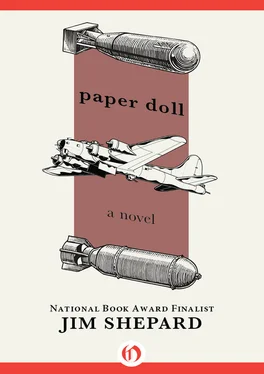They lay on the hardstand under the wing of Archangel , more or less uncertain as to what they were supposed to be doing. Their commanding officer had been a car salesman from Pocatello, Idaho, and there was no acute sense around the base, yet, that the aircrews’ ground time needed to be filled. The sun was warm and welcome on their legs. They’d just been playing with hoses and Lewis was letting his shirt dry on him. Bobby Bryant had spread his over a dismantled engine nacelle. Bean lay asleep on the grass with his head on a bag of doughnuts. His cheek and open mouth were turned to the bag, and the illusion was that of a swimmer taking a breath, or someone eating in a novel way.
They were new to all of this and fairly sure they had a good deal more to learn, but no one was going to ask for work. From what they could understand, the 8th Air Force was still in a disconcerting state of confusion.
Bobby Bryant was talking about back home, Providence, Rhode Island, and Lewis and Snowberry were lethargic enough to give him their attention, and Bean was asleep, so there was no one to interrupt him. He was encouraged.
His family had owned a series of dogs, all kept outside, all high-strung and aloof from Bobby — all his father’s dogs, his mother liked to say. He remembered at five or six sitting in the hot sun with one of them, Toby, a small squat mongrel with German Shepherd somewhere in its bloodlines. Somehow he had reached for it and Toby had nipped his fingers, forearm, and bicep in a frenzy of irritation, and then had almost immediately resumed a sort of placidity. He’d been terrified of the dog after that, and the dog, as if to torment him, had developed a way of covertly lifting a lip in a silent snarl when only Bobby was looking. He did not risk his father’s contempt by bringing it up.
They got the dogs through the mail — unflagging and omniscient hunting breeds promised from faraway kennels — and unfailingly the dogs arrived with some affliction — one eye ruined, a serious limp, odd lumps on the neck or chest — and a disposition soured by it.
They fell like Limeys at the Somme, his uncle who fancied military history liked to say. Toby was hit by a car. Corky tore off in full throat after a bird of some sort and plummeted, still baying, from a rocky outcropping. King died of an infection that made an eye swell up grotesquely. Someone poisoned Snapper, an animal of such epic nastiness that it had to be chained at all times. Neighborhood children, Bobby remembered, gathered at safe distances to watch it foam and tear with a chilling intensity at its chain and collar, in such awe of the animal’s fury that they did nothing to tantalize it further, only watching day after day in hushed silence, as one might watch a volcanic eruption.
Tippi, Bobby’s favorite, a smallish white and black animal with an inexplicably crushed ear, disappeared on one of his father’s hunting trips and was never heard from again. The notion haunted Bobby that perhaps the dog had been hurt and left to fend for itself, and was even now dragging itself around the same stretch of forest in eastern Connecticut, its eyes wide with hunger.
All the dogs had frightened his sister Amy terribly — Toby had even stalked her when they were alone, its head low in wolfish concentration — and she kept as a talisman against them a gingham stuffed animal resembling a pork chop that her mother had made for her. She called it Miss Ebboo, introduced it only to Bobby, and lived in fear her father would find it.
“Miss Ebboo,” Lewis said. It did not sound as if he was enjoying the story.
When he was a kid, Bryant went on, about seven, and the Depression had really hit, he remembered that it was clear to even the smallest kids in the neighborhood that there was something screwed up about the world the way they understood it and that a guy like his father or a neighbor could work hard and be good at something and still find out no one wanted him. He had told his sister then and there that he was going to be a pilot someday, flying around Texas and the ocean.
“Why don’t you give it a rest for a while,” Lewis said, and Bryant stopped talking. He closed his eyes to the sun and remembered St. Louis winning the World Series, cheating his Athletics. He remembered Capone going to jail, as if having just given up. He remembered his parents refusing to let him see Frankenstein , his mother herself in fact refusing to go, and his father taking it in one Saturday night alone without telling him, breaking his heart, and returning to pronounce it windy. He remembered his father leaning conspiratorially close and allowing, with a cruelty that still left Bryant breathless when he thought about it, that the monster was certain as ants something to see.
He remembered the world and his father shutting down possibility, and pilots — aero-men — as always the vivid exception. He resolved maybe then, thinking of the monster he still had not seen, the monster they wouldn’t put on the advertising posters, that he was going to fly. The possibility of washing out was too terrible to entertain.
They lay spread out with the other crews beneath the wings of B-17F Flying Fortresses. They had been discussing with intermittent interest the possibility of the Wing’s acquisition of impressive new B-17G Flying Fortresses. The interest in the G variant was not casual: it was supposed to feature a remote-controlled turret in the nose beneath the bombardier’s station, forming a kind of chin on the plane. The turret held two fifty-caliber Brownings and struck them all as an enormous improvement over the single pivot-mounted machine guns in the nose of their F. German interceptor tactics for confronting the massed Fortresses had evolved almost exclusively into head-on passes to take advantage of the relative futility of the F’s nose armament. And, as Lewis liked to remind them, the relative futility of the F’s gunners. The tactics had become very successful. They thought about the G’s with a healthy and selfish dislike for any other crews that might receive them first.
The first airplane Bryant had ever seen had crashed while he was watching. It had been an old yellow De Havilland biplane, looping and sideslipping over Narragansett Bay, perhaps for the entertainment of the bathers on the surrounding beaches. Bryant had been standing knee deep in a warmed and reedy part of an inlet. The water around his legs lapped and rippled quietly. The engine changed pitch and the biplane had trembled in mid-air, and while he watched, it folded at the center as if on delicate hinges, collapsing upon itself and twisting apologetically downward. Rowboats had labored out to the point of the splash.
Their crew chief, an unpleasantly beefy twenty-four-year-old named Tuliese, was standing on a rolling metal scaffold beside their plane, Paper Doll , a few hundred yards down the flight line. He was painting a small vertical yellow bomb six feet or so beneath the pilot’s side window. The bomb denoted a mission flown, and now there were two on the plane. Tuliese held the piece of sheet steel he used as a palette aloft to block the sun while he worked. The flashing dazzled Bryant.
Snowberry was practicing his Crosby, nestled comfortably against some folded tarps the line crews used to protect engines under repair. He introduced himself as Tech Three Gordon Snowberry, Jr., somewhat proud of being the lowest-ranking crew member in Paper Doll , and made just about everyone who met him wonder at exactly what age the Army Air Forces decided someone was too young for service in the Air Corps. He was blond and small and did not shave, and was convinced his voice had a mellow resonance uncannily matching Bing Crosby’s.
Читать дальше












